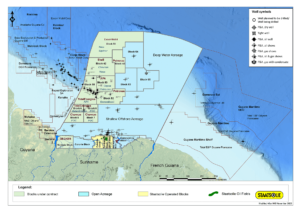By: Sueann Wickham
In the dynamic and often volatile world of energy, the Caribbean is emerging as a surprising player with immense potential. At the heart of this transformation is natural gas, a resource that promises to redefine the region’s energy landscape.
Melanie Chen, Founding Chair of the Caribbean
Energy Chamber (CEC), in a recent interview with Energy Republic, shared insights into how natural gas is set to become the cornerstone of a sustainable and secure energy future for the Caribbean, and how collaboration among key players like Guyana, Suriname, and Trinidad & Tobago can unlock unprecedented economic growth.
Chen noted that the Caribbean is currently on the brink of an energy revolution, driven by the newfound natural gas reserves in Guyana and Suriname. “Guyana and Suriname have significant new oil and gas discoveries which have accelerated economic growth, especially in Guyana,” she explained. While Guyana has already started reaping the benefits, Suriname is poised to follow suit, with enormous potential still to be tapped.
Trinidad & Tobago, historically a major player in the Caribbean energy sector, also boasts a sophisticated downstream sector, including liquefied natural gas (LNG), ammonia, and methanol production. Despite signs of decline in traditional oil and gas production, the country’s existing infrastructure and expertise make it an ideal partner for regional energy collaboration, according to Chen.
She was keen to note that the narrative of the Caribbean energy sector is not just about individual national achievements but about regional synergy. In emphasizing the strategic importance of collaboration between Guyana, Suriname, and Trinidad & Tobago, she said, “There are significant economic and operational synergies to be explored.”
Natural gas is increasingly viewed as a critical transition fuel that can bridge the gap to a greener energy future while ensuring economic stability. By pooling resources and expertise, these countries can leverage their natural gas reserves to create a more resilient and interconnected energy grid, reduce dependence on imported fuels, and lower energy costs for their citizens.
In underscoring the transformative economic potential of natural gas for the Caribbean Chen noted that the development of these resources can drive job creation, stimulate industrial growth, and enhance energy security. “Time efficiency in monetizing oil and gas reserves will be key for sustainable future economic development for the Southern Caribbean,” she asserted.
Natural gas not only provides a cleaner alternative to traditional fossil fuels but also supports the expansion of renewable energy by stabilizing the grid and providing backup power. This dual role makes it a critical component of the region’s energy strategy, balancing immediate economic benefits with long-term sustainability goals.
Despite its promise, the path to a natural gas-powered future is not without challenges. Chen pointed to the significant infrastructure investments needed to support the extraction, processing, and distribution of natural gas. “We need to focus on upgrading transmission grids and building out battery storage,” she said, emphasizing the need for a robust and modern energy infrastructure.
The high upfront costs associated with these developments can be a barrier, particularly for smaller Caribbean nations with limited financial resources. However, Chen advocated for a mix of public and private investment, alongside international collaboration, to finance these critical projects. “A just transition requires substantial public funds, complemented by private sector investment,” she explained, calling for a holistic approach to funding that includes government spending, concessional financing, and public-private partnerships.
The Role of the Caribbean Energy Chamber
The CEC plays a pivotal role in facilitating this transition, acting as a hub for regional cooperation and dialogue. Chen described the Chamber as a “formal but informal mechanism” that enables frequent meetings among energy stakeholders to address common challenges and opportunities. By fostering a spirit of collaboration and shared purpose, the CEC helps to drive forward the region’s energy agenda.
The 2024 Suriname Energy, Oil, and Gas Summit
The Suriname Energy, Oil, and Gas Summit (SEOGS) 2024 which was held from Tuesday, June 4 to Friday, 7, represents a critical moment for the region to showcase its potential and attract international interest and investment. As a key speaker at the summit, Chen at the time of the interview noted plans to emphasize the importance of strategic collaboration and the role of natural gas in achieving energy security. “Suriname is on the cusp of becoming a major energy player, and this summit is an opportunity to highlight its sustainable, economic potential,” she said.
A Future Powered by Natural Gas
Chen’s insights underscored the transformative potential of natural gas for the Caribbean. By harnessing this resource and fostering regional collaboration, the Caribbean can not only secure its energy future but also drive significant economic growth. As the region stands at the threshold of an energy revolution, the strategic development of natural gas offers a path to a more sustainable, resilient, and prosperous future.

In an era where energy security and economic stability are more critical than ever, the Caribbean’s natural gas reserves represent a beacon of hope and opportunity. With the right investments and a commitment to regional collaboration, the Caribbean can position itself as a leader in the global energy landscape, paving the way for a brighter and more sustainable future.













